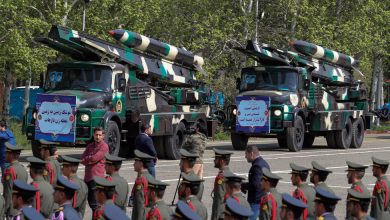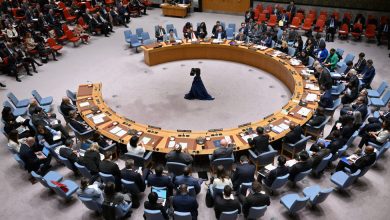How a Globetrotting Family Learned to Love Soccer and the ‘Grey Wiggle’

The Australia Letter is a weekly newsletter from our Australia bureau. Sign up to get it by email.
SYDNEY, Australia — I woke up early Tuesday morning, figuring that the World Cup qualifier in Qatar between Australia and Peru would already be over — but no. It was still scoreless after extra time.
I jumped out of bed and said something to my wife, Diana, about a “shootout,” then had to quickly explain that I did not mean another mass shooting in America.
“No, no, soccer,” I said. “Penalty shootout.”
The stakes were huge: The winner would continue on to the World Cup in November while the losing team would go home, the players’ heads held down in shame.
A few minutes later, Diana and I were in front of the television. We screamed when Peru stopped Australia’s first shot. We watched with a deep sense of worry for Australia when the Socceroos swapped out their usual goalkeeper for Andrew Redmayne, the “Grey Wiggle” who dances like a child in front of the goal before trying to stop an opponent’s kick.
It seemed like it would be impossible for Australia to win. Diana and I had lived and traveled in Latin America. We knew how seriously the countries there take their fútbol.
Read More on the 2022 World Cup
- Ambitious Goals: FIFA has given up on a plan to hold the World Cup every two years. But its president’s plans for the future are bold.
- Rule Change: World Cup coaches will now be allowed to use as many as five substitutes per game and draw from expanded rosters.
- Chile’s Failed Bid: The country’s soccer federation had argued Ecuador should be ejected from the tournament to the benefit of the Chilean team. FIFA disagreed.
- Golden Sunset: This year’s World Cup will most likely be the last for stars like Lionel Messi and Cristiano Ronaldo — a profound watershed for soccer.
- Senegalese Pride: Aliou Cissé, one of the best soccer coaches in Africa, has given Senegal a new sense of patriotism. Next up: the World Cup.
Over many years and locations, we’d also come to worship World Cup soccer with a special kind of zeal. I was a late convert. I watched my first matches as an adult, during the 1998 World Cup, while traveling with friends in Peru. After Diana and I got married and started living the life of restless correspondents, we became even more committed. International soccer was something found everywhere that let us bond with almost anyone.
When we covered the Iraq war, we heard gunfire shot into the air across Baghdad whenever the national team won, and we still celebrated every qualifier and small tournament win. At one point in 2007, we even found ourselves jumping up and down in a restaurant in Amman, Jordan, hugging strangers fleeing the war after Iraq won a tight match. I don’t remember the score. I remember Iraqi flags and a rare emotion at the time. Pure joy.
When we moved to Miami after that, soccer brought us another happy moment. Unexpectedly, the World Cup even managed to weave itself forever into family lore.
It was the afternoon of July 2, 2010. Ghana and Uruguay had played to a tie in a quarterfinal match, and the penalty shootout seemed to carry extra meaning. The tournament took place in South Africa, and Ghana was the last African team remaining. Diana and I were both desperate for Ghana to win — so after they missed a key shot, Diana jumped up out of her chair, twisted and punched the air.
She was 38 weeks pregnant. She felt something stretch. About five hours later, our daughter Amelia was born, with a shove into labor from the World Cup.
For us, cheering for Australia’s team is simply a natural progression. I like Peru, and I have to admit, I’m not a fan of Australia’s uniforms with their odd and unnecessary collar, but as the shootout continued on Tuesday, there was no doubt which team Diana and I were cheering for. We chewed our nails as the two teams exchanged goals. We smiled at the Grey Wiggle’s moves, hoping that silliness would not fail, but fearing it could.
And then, when he stopped the final shot that secured the win — and stood up, mouth agape, looking shocked — we were right there with every other Australian who happened to be watching at the odd pre-coffee hour, jumping up and down like toddlers on a trampoline.
If you’re wondering what we looked like, it was a bit like ABC News Breakfast’s Tony Armstrong, who was celebrating with fans at Federation Square in Melbourne, hopping around on live television and shouting: “We’re through, we’re through to the World Cup!”
By that point, our son, Balthazar, had joined us for the final minutes of the match. Amelia was straggling in with bleary eyes, asking what was going on and why we were all so awake.
“Soccer,” I told her.
She nodded, hardly surprised at seeing her parents out of breath with excitement. She knew the deal. Soccer is the world’s game, for our world-loving family. It’s the sport that’s inseparable from the story of her birth. It’s the special kind of contest where nationalism can be borrowed and passion can be shared across nearly every divide.
And now, it’s where the Wiggle wins.
Here are our stories of the week.
Australia and New Zealand
-
Chinese Pilots Sent a Message. American Allies Said They Went Too Far.Australia and Canada said Chinese jets harassed their military planes, though Beijing says it was defending its security. A mishap over Pacific waters could have ominous repercussions.
-
Australian Paper Deletes Rebel Wilson Column but Denies Outing Her. The actress disclosed her relationship with Ramona Agruma a day before The Sydney Morning Herald published a column about it. The writer, Andrew Hornery, said he had made mistakes and would learn from them.
-
Opinion: The U.S. Is Losing Its Military Edge in Asia, and China Knows It.American can no longer deter China without help from its allies.
-
Opinion: What It Took for a Country With a Strong Gun Culture to Give Them Up.Australia’s success with gun reform was mostly a result of timing, luck and the idiosyncrasies of its Constitution. But it does hold important lessons for the U.S.
Around The Times
-
How Extreme Heat Kills, Sickens, Strains and Ages Us. Researchers are drilling down into the ways life on a hotter planet will tax our bodies, and looking for protections that, unlike air-conditioning, don’t make the problem worse.
-
Brutal Beating of Women in China Highlights Risk of Saying ‘No.’Graphic footage of an attack in a restaurant fueled online debate that showed both the growing awareness of women’s rights and how divisive feminism still remains.
-
China’s Xi offers closer cooperation with Russia in a call with Putin. The Chinese government has tried to keep good ties with Moscow while maintaining that it wants to be an impartial broker for peace in Ukraine.
-
The Battle Over Gender Therapy. More teenagers than ever are seeking transitions, but the medical community that treats them is deeply divided about why — and how to help them.
-
Emma Thompson on Baring It All Onscreen at 63.The actress made the choice to disrobe. Still, she says, it was the most difficult thing she’s ever done in her four-decade career.
Enjoying the Australia Letter? Sign up here or forward to a friend.
For more Australia coverage and discussion, start your day with your local Morning Briefing and join us in our Facebook group.




